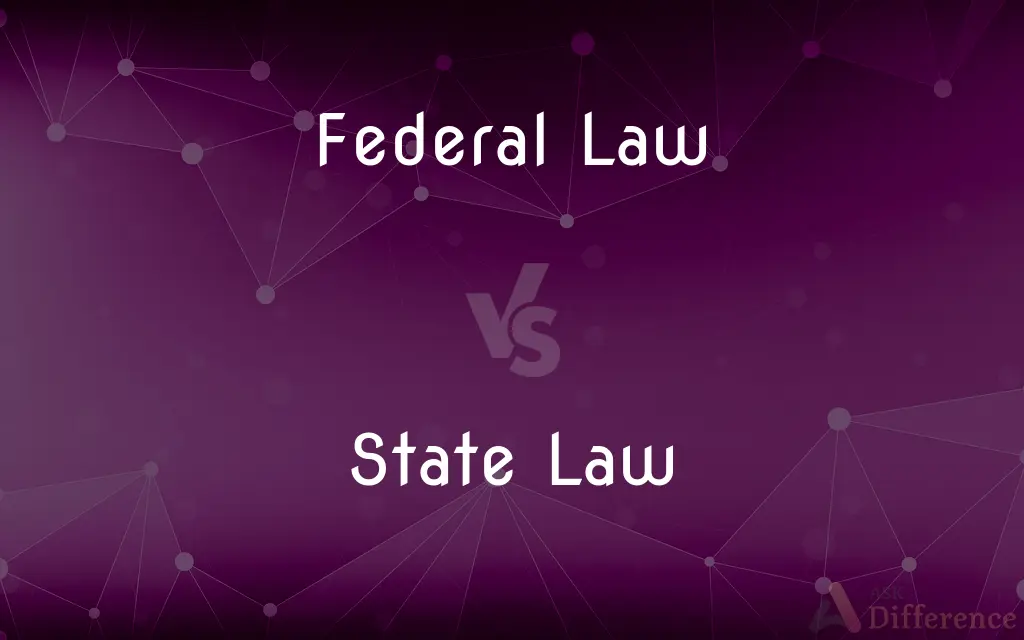Federal Law vs. State Law — What's the Difference?
By Tayyaba Rehman — Published on November 13, 2023
Federal Law is established by the federal government and applies nationally; State Law is enacted by individual states and applies only within that state's borders.

Difference Between Federal Law and State Law
Table of Contents
ADVERTISEMENT
Key Differences
Federal Law is a body of regulations and statutes set forth by the federal government. These laws have jurisdiction across the entire nation. On the other hand, State Law is devised by individual state legislatures and applies exclusively within the boundaries of a particular state.
While Federal Law reigns supreme due to the Supremacy Clause in the U.S. Constitution, State Law can address issues not covered at the federal level or can provide further detail on federal mandates.
Federal Law can address matters like immigration, bankruptcy, and copyrights, which are under national jurisdiction. State Law, meanwhile, handles topics like marriage, property, and criminal statutes specific to the state's preferences and cultural norms.
Though Federal Law provides a consistent legal foundation across all states, it respects the principle of states' rights, allowing State Law to govern local issues more intimately. This division ensures a balance of power and flexibility in addressing diverse regional concerns
Comparison Chart
Jurisdiction
Nationwide
Within a specific state
ADVERTISEMENT
Creation
Federal government
Individual state legislatures
Typical Matters
Immigration, bankruptcy, copyrights
Marriage, property, specific criminal codes
Conflict Resolution
Supremacy Clause ensures dominance
Must yield to Federal Law if a conflict arises
Application Consistency
Uniform across states
Varies from state to state
Compare with Definitions
Federal Law
Federal Law provides a consistent legal basis across the country.
Businesses follow Federal Law regarding minimum wage, ensuring uniformity in employee payment.
State Law
State Law is crafted by the state's legislature.
The legalization of recreational marijuana in Colorado was a decision made through State Law.
Federal Law
Federal Law can override State Law in case of a conflict.
When State Law contradicts Federal Law, the latter prevails.
State Law
State Law is specific to an individual state within the U.S.
California's emission standards are determined by State Law.
Federal Law
Federal Law addresses issues of national significance.
National defense policies are determined by Federal Law.
State Law
State Law addresses issues pertinent to that state's residents.
Each State Law can determine its own minimum wage based on local economic conditions.
Federal Law
Federal Law originates from the U.S. Congress.
After Congress passed the legislation, it became Federal Law.
State Law
State Law can vary significantly between states.
Gun regulations differ widely due to variations in State Law.
Federal Law
Federal Law applies to all states in the U.S.
The Civil Rights Act is a Federal Law that prohibits discrimination nationwide.
State Law
State Law can offer more detailed regulations on federal mandates.
A State Law might specify further environmental protections beyond Federal Law.
Common Curiosities
What is Federal Law?
Federal Law is legislation passed by the U.S. Congress and applies nationwide.
Who creates Federal Law?
Federal Law is established by the U.S. Congress.
How does State Law differ from Federal Law?
State Law is specific to an individual state and can address localized issues, whereas Federal Law applies across the country.
Can a state have laws not found in other states?
Yes, State Law can be unique to address specific needs or preferences of that state.
Do all states have the same laws?
No, while some laws may be similar, each state can have its unique set of laws.
Which court handles Federal Law disputes?
Federal courts handle disputes related to Federal Law.
Are there areas solely governed by Federal Law?
Yes, matters like immigration or international trade are exclusively under Federal Law.
Can State Law override Federal Law?
No, due to the Supremacy Clause, Federal Law will prevail if there's a conflict.
Who is responsible for making State Law?
State Law is crafted by individual state legislatures.
Are citizens bound by both Federal and State Law?
Yes, individuals must comply with both sets of laws.
What happens if a State Law contradicts Federal Law?
Federal Law takes precedence and the State Law would be invalidated in that conflict.
Can State Law be more restrictive than Federal Law?
Yes, a state can implement stricter regulations than what Federal Law mandates, as long as they don't conflict.
How can a citizen influence State Law?
Citizens can vote, engage with state representatives, or participate in local advocacy efforts.
Where would a case concerning State Law be adjudicated?
Typically, in state courts within the state where the law applies.
How are changes made to Federal Law?
Through legislative processes in Congress and the president's approval.
Share Your Discovery

Previous Comparison
Early Man vs. Modern Man
Next Comparison
Transcript vs. Degree CertificateAuthor Spotlight
Written by
Tayyaba RehmanTayyaba Rehman is a distinguished writer, currently serving as a primary contributor to askdifference.com. As a researcher in semantics and etymology, Tayyaba's passion for the complexity of languages and their distinctions has found a perfect home on the platform. Tayyaba delves into the intricacies of language, distinguishing between commonly confused words and phrases, thereby providing clarity for readers worldwide.
















































